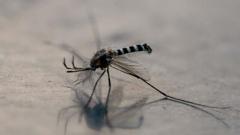Colombia has declared a nationwide health emergency following the death of at least 34 individuals due to yellow fever, according to official reports. This severe illness is caused by a virus transmitted by infected mosquitoes, and it can be effectively prevented through vaccination. Officials are urging the public to get vaccinated ahead of the Easter weekend, a peak travel time when many Colombians will visit warmer regions where these mosquitoes thrive.
Health Minister Guillermo Alfonso Jaramillo announced that those traveling to high-risk areas must present proof of vaccination. The current outbreak has seen 74 confirmed cases, a staggering increase compared to previous years, where only two cases occurred in 2023, and there were none between 2019 and 2022. Jaramillo communicated on Colombian radio that this outbreak is particularly dangerous, noting a mortality rate nearing 50% among affected individuals.
Most of the cases have been reported in Tolima province, known for its picturesque coffee plantations and tourist attractions. President Gustavo Petro alerted citizens via social media that unvaccinated individuals should refrain from visiting risk-prone areas during the Easter season, particularly in the coffee-growing regions.
Yellow fever symptoms can often mimic other diseases, making diagnosis challenging. The World Health Organization (WHO) indicates that while most individuals recover from the first phase of the infection—which includes fever, pain, and nausea—about 15% progress to a more severe second phase that can lead to jaundice, bleeding, and kidney failure, with a grim survival rate of 50% within 10 to 14 days for those entering this stage. Vaccination remains the key defense against this potentially deadly disease in Colombia.



















